I am still processing my dad's death, having recently been to Minnesota to deal with his estate issues.
My parents were divorced in 1970. By all accounts, it turned into an unhappy marriage. I was greatly pained by their divorce, for several reasons. First, I was the eldest, and eldest children tend to feel responsible for these things. Second, neither my mom nor my dad would talk openly about what was happening. Neither of them ever asked, "How are you feeling?" Neither of them ever said, "No matter what is happening between your mom/dad and me, I still love
you."
Third, I really did feel it was my fault. In the spring and summer of 1970, my friends and I started to experiment with shoplifting. We would go to the local version of 7/11, and steal candy, or gum. Or we would go the Apache Plaza mall and steal small stuff. For some reason, I got it in my head that I would go one Saturday and steal one thing from every store in the mall. I nearly made it. I wore a dark blue windbreaker, and just went from store to store, stuffing things in my jacket. I must have looked like the Michelin man when I finally got to Montgomery Wards. There, I stole a fishing lure to complete my "haul." As soon as I left the store, the store security nabbed me. I was taken back to his office, filled out a report, and then was "escorted" home in the back of a St. Anthony police cruiser.
The cop was very nice, and explained to my dad what had happened. The chill in the house was immeasurable. When my mom got home, I had to explain to her what I had done, and then I was sent to bed, at about 6:00 p.m. I went to sleep that night hoping and praying never to wake up again. Fortunately, I did wake up again. But the issue was never discussed. Ever. But the chill from my dad towards me was absolute, and the chill between my parents seemed to increase.
I thought they had a good marriage. Unlike my Italian friends' parents, who were always screaming at one another one minute, and then hugging and kissing the next. I never got that. Now I see that at least they were communicating. My parents were not. Perhaps they did not know how. Perhaps it was a poor upbringing. Perhaps it was sheer selfishness.
Whatever the case, I can imagine that my dad concluded that it was my mom's permissiveness that caused his eldest child to become a criminal. My mom probably concluded that my dad's tyrannical attitude was driving the eldest son away. Perhaps both were right. Perhaps, as a counselor once said, I was crying out for attention.
Any attention. My parents were so silently hostile to one another, that there was no room left for my brother and I, and we needed our parents.
So, for many years, I put two and two together, and blamed myself for the divorce. Because it was only weeks/months later that my dad one day left. Saying nothing. Just got in his 1969 Ford Mustang Grande and left. While my mom sobbed.
Since then, I have made it a point to study the literature about divorce, and the impact on children. The first book I read on the subject was Judith Wallerstein's landmark book,
Second Chances : Men, Women and Children a Decade After Divorce. It was the first longitudinal study done on the affects of divorce. Most books focused on surviving divorce, or recovering from it. But Wallerstein followed some families through the divorce and for the next few years, checking in on them periodically. I was intrigued by her next book,
The Unexpected Legacy of Divorce: The 25 Year Landmark Study. She tracked the same initial families for 25 years.
Her conclusion was that in divorce, everyone loses. Less than 10% of those affected by divorce were doing better 25 years later. "Better" was measured emotionally, relationally, fiscally, physically, mentally, spiritually, etc.
Her two prescriptions were these: for kids to have a good chance at coming out of this OK, both parents needed to keep in active contact with the kids, and the parents could not under any circumstances use the kids to get back at the other spouse. ("Son, your mom's a drunk." "Daughter, your father is a pathological liar.")
Wallerstein's next book was
What About the Kids? Raising Your Children Before, During, and After Divorce, which addresses the issue from a prescriptive, rather than a descriptive point of view. I have not read this.
Today, I discovered another book out on the subject, and it seems to add to the "divorce is a bad thing" side of the debate. It is written by Elizabeth Marquardt, and entitled,
Between Two Worlds : The Inner Lives of Children of Divorce. A good review by Michael McManus is
here.
To be fair, my parents did the best they could. My dad always sent child support and alimony every month. I used to take that for granted, until meeting friends for whom that was not the case in their family. Still, I wonder what would have happened if they had gone to counseling, if they had had supportive, caring people, who would have intervened and tried to save the marriage. Or at least, to process it in a more healthy manner.
I understand the guilt and shame from the inside. I am loathe to confess and confront my own "sins". It is hard for me to ask for help. It is hard for me to forgive. It is hard for me, once a mistake has been made, to confess it. So I understand my parents' never talking about this. It was embarrassing. They had failed at fulfilling "Til death do us part". And they suffered for it, as my brother and I did, in different ways.
The end of the story was better than the beginning. My dad married Susan, a professional friend and colleague, in 1970. And he thrived in the relationship. My mom married Kel Pierce, having met him at a bridge club, in 1981. They, too, were happily married.
The point of the story is not "they lived happily ever after". The point of the story is not that we can screw up our primary commitments and still come out well on the other end. The point of the story is that God, in his grace, does not consider failure to be the final word in our lives.
On Tuesday,
Batman Begins came out on DVD. Bruce Wayne, played by Christian Bale, and Alfred, played by Michael Caine, have a moving relationship in the film. At one point, Bruce utters in despair that, "I've failed, Alfred."
To which Alfred says, "Master Bruce, why do we fall? So we can pick ourselves up." (A repeated phrase in the movie, first uttered by Bruce's father.)
Bruce says, "You have never given up on me, have you?"
Alfred then stares hard at Bruce, and says, "Never!"
God, in his mercy, has never given up on us. He did not give up on my mom, or dad. He has not given up on me. And that brings a measure of comfort.













